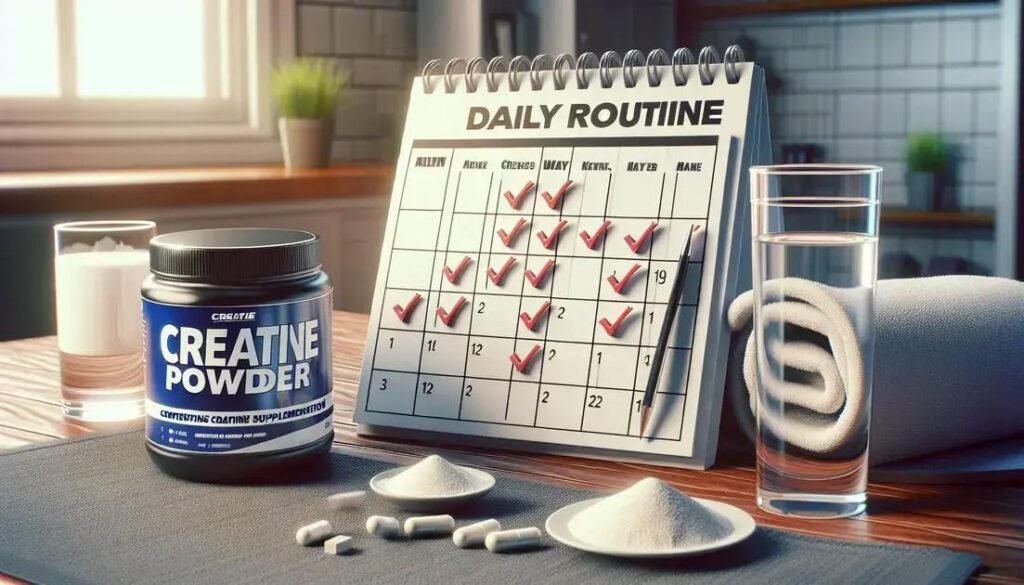Creatine is one of the supplements most popular and researched in the world, used mainly by those looking for more strength, endurance and muscle mass. But after all, What is creatine for?? In this complete guide, you will understand how this supplement works in the body, you main benefits of creatine, the correct way to take, and also clarify common myths and doubts, such as the issue of fluid retention, side effects and its effectiveness in groups such as the elderly.
Summary
What is creatine and how does it work in the body?
THE creatine is a natural substance produced by the body from amino acids arginine, glycine and methionine. Its main function is increase phosphocreatine stores in the muscles, which allows for the rapid regeneration of ATP (cellular energy used in high-intensity physical activities).
Creatine is stored in the muscles and released during short, intense bouts of exercise. When increase muscle energy level, it improves performance and reduces recovery time between workouts.
What are the benefits of creatine?
You benefits of creatine go far beyond gaining strength. It is effective in improving sports performance, supporting brain health and promoting well-being general physique. In addition, creatine:

- It favors the gain lean muscle mass;
- Improves performance capacity in high-intensity activities;
- Accelerates post-exercise recovery;
- It has neuroprotective effects and can help with cognitive health;
- Helps seniors prevent sarcopenia (loss of muscle mass with age).
THE Creatine is one of the most studied supplements in the world, with thousands of scientific studies proving its effectiveness and safety.
Does taking creatine make you gain weight or help you gain muscle mass?
A common question is whether creatine makes you fat. The answer is no. What can happen is a slight initial weight gain due to intramuscular water retention, which is positive: this water is stored inside the muscle and contributes to its volume and performance.

Creatine does not cause subcutaneous retention, the one that would leave the body “swollen” or “chubby”, as they say. This is a myth that science has already debunked. The muscle volume promoted is healthy and desired, especially for those seeking hypertrophy.
What is the ideal dose and how to take creatine?
The general recommendation is to 3g to 5g of creatine per day. Another way to calculate is to use the formula:
0.07g per kilo of body weight/day. For example, a 70kg person would consume 4.9g.
THE effect of creatine is chronic, i.e, depends on continuous use to keep muscle stores saturated. Therefore, it must be consumed daily, including on non-training days. The time is not so relevant, but the post-workout with a meal rich in carbohydrates and proteins may favor absorption.
What is the best time to take creatine?
There is no single mandatory schedule, but some evidence shows that take creatine after training may be more effective in stimulating recovery and protein synthesis. Still, what matters most is constancy in daily use.

You can also divide the dose — half before and half after training — or always consume it with a meal. The important thing is to maintain regular consumption to ensure the desired effect.
Is creatine monohydrate the best option?
Yes. A Creatine monohydrate is the most studied, safe, effective and cost-effective form. Versions such as micronized creatine, HCL, buffered (Kre-Alkalyn), liquid or in capsules have not shown, to date, real and consistent advantages on the monohydrate form in reliable studies.
Micronized creatine may have better dissolution in water, which helps with practicality, but the effectiveness is equivalent to the common monohydrate version.
Do I need to take Creapure creatine? Is it really better?
THE Creapure is a registered German trademark of creatine monohydrate recognized for its high purity. However, other quality brands also produce pure and effective creatines.
In Brazil, the ANVISA establishes quality and purity standards for supplements, and the ABENUTRI (Brazilian Association of Nutritional Products Companies) carries out laboratory analysis to ensure that the products meet standards.
The most important thing is to check if the product:
- It is a trusted brand;
- It has certifications and purity reports;
- Contains no unnecessary additives or contaminants.
Is creatine only recommended for bodybuilders?
Although it is well known among bodybuilders, creatine is not restricted to this audience. It is useful for:
- Elderly, to maintain strength and prevent muscle loss;
- People undergoing physical rehabilitation or with muscular diseases;
- Students and professionals seeking cognitive support;
- People who practice short-duration, explosive sports (such as running, football, fighting).
Its use can be beneficial even for sedentary individuals looking to improve functional performance or protect brain function.
👉 Want to better understand how creatine fits into your routine and learn about other essential supplements? Check out our complete guide to dietary supplements and discover how to use each one safely and efficiently.
What are the side effects of creatine?
THE creatine is considered one of the safest supplements available. Side effects are rare and generally mild:
- Some people may feel stomach discomfort, especially when taken on an empty stomach;
- In isolated cases, it may occur nausea or intestinal cramps, which are resolved when consumed with food;
- THE intramuscular fluid retention, when it occurs, it is mild and beneficial to muscle growth, and does not represent visible or harmful body swelling.
Who has kidney problems should consult a doctor before use, but there is no evidence that creatine causes kidney damage in healthy people.
Can creatine be taken every day? Do I need to take a break?
Yes, it should be taken daily. Creatine needs to be maintained in the body at stable levels, and therefore the continuous supplementation is ideal.

There is no need to “cycle” creatine use. Studies show that continuous use for months or years is safe, as long as the appropriate dosages are respected (3g to 5g per day).
THE consistency in use is what will bring the expected results.
Final Summary: All About Creatine
- THE Creatine is a safe, well-studied, and affordable supplement;
- Helps in increased strength, muscle mass and physical performance;
- Also has positive effects on brain health and in the elderly;
- THE effect is chronic — needs to be taken every day;
- The shape monohydrate is the most suitable;
- THE fluid retention is muscular, non-subcutaneous and does not cause visible body swelling;
- There is no need to take breaks, continuous use is safe;
- Consult a nutritionist or health professional to adapt the dosage to your case.
Creatine is one of the few supplements with benefits widely proven by science, suitable for different age groups and lifestyles. If you are looking for a simple and effective way to improve your health, performance and disposition, It is worth considering creatine in your daily routine.



